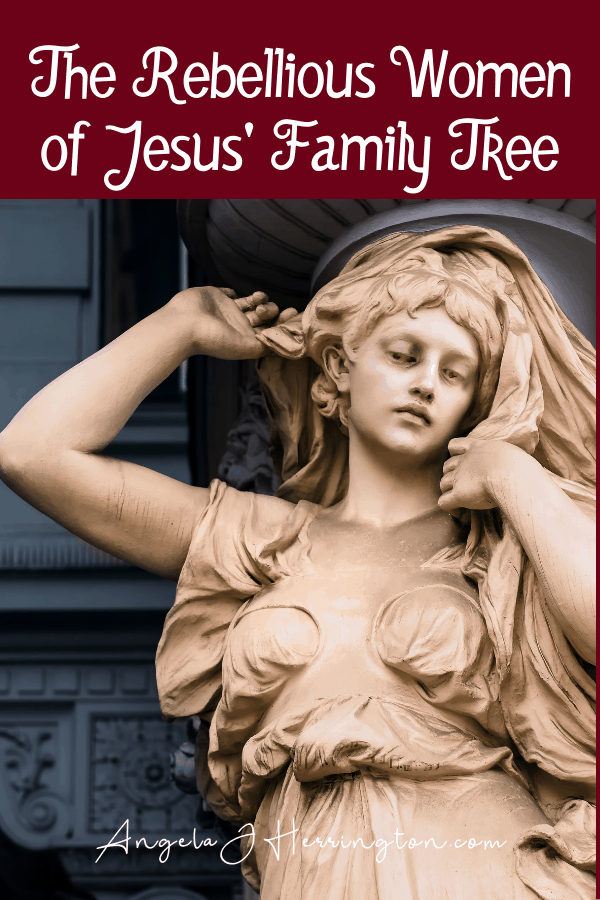You’ve probably been taught Tamar, Rahab, Ruth, Bathsheba, and Mary are in Jesus’ family tree.
(Technically Bathsheba is only listed as Uriah’s wife, but we still count that as a naming in patriarchal biblical texts that often COMPLETELY left women out of the story.)
Each woman faced her own unique struggle and is considered an example of courageous faith. They’re (rightfully) lifted up as examples of how Christian women should pursue God, and a godly life. Perhaps you’ve even heard sermons about how these women were amazingly loyal and obedient to God’s will.
But there’s something patriarchal sermons haven’t taught us about these women.
In addition to all the things we normally praise them for, there’s one common thread woven through all of their stories.
And it’s a dangerous truth that threatens the patriarchal status quo.
The patriarchal church that many of us were raised in don’t want us to notice this common thread because it challenges their belief that godly women are submissive, obedient, and must always fall under the spiritual authority of all men.
All 5 women, these exalted ancestors of Jesus, were rebellious women.
Each fought back against the toxic religious culture that tried to limit her because of her gender.
They were humble, but not meek or small.
At great physical risk, they didn’t do what was expected.
And {{{SPOILER ALERT}}} God didn’t punish them for being rebellious women.
Knowing the biblical heroines we emulate rebelled is dangerous, because it might embolden us to rebel against our own oppression and the oppression of our neighbors. As we grow bolder in our rebellion, we become more unpredictable and harder to control.
Rebellion is particularly dangerous to those trying to hold on to power that doesn’t belong to them.
Here’s the TLDR version of how each woman rebelled against her culture and systemic oppression. (If you want to know more about each women, stay tuned – I promise to write more on each rebellious women in 2021)
Tamar’s Rebellion (Genesis 38)
- Refusing to obey Judah (her Father in Law) when he sent her away to ‘wait’. Not only did she refuse to live in patriarchal limbo as a women with no husband and no male children, she created a complex plan to get pregnant and preserve the bloodline.
- Challenged Judah’s ability (or desire) to pay what he promised and asked for pledge. Remember, she is intimately familiar with Judah’s track record of keeping his word.
- Publicly called him out as the father of her child when he sent the mob to burn her for sinning against his ‘honor’. Tamar was in the same position as the woman in the New Testament who is about to be stoned. But she had the courage to work her plan and put Judah’s reputation on the line in a very public way.
Rahab’s Rebellion (Joshua 2)
- Rahab lied to the King of Jericho and hid Joshua’s spies. She protected the spies and even misdirected the soldiers who were trying to capture the invaders. She didn’t just look the other way… and she contributed to the survival of the spies.
- She then made a pact with foreigners who were plotting a coup to overthrow her government. Treason, espionage, and falling in with the enemy is HIGHLY rebellious.
Ruth’s Rebellion (Ruth 3)
- Ruth risked scandal and severe punishment when she rebelled against purity norms and came to Boaz in the night. Plus, she went ALONE! Can you imagine how that would have impacted the public perception of her “noble character”?
- Like Tamar, Ruth was forthright in asking him to be her kinship redeemer instead of Boaz initiating it. She sought out a relationship that she was supposed to be passive in.
- There are also several fascinating opinions that the subtitles of the language get lost in modern translations and Ruth and Boaz were physically intimate that night. Read more about that here.
Bathsheba’s Rebellion (2 Samuel)
1. Bathsheba sent word with a messenger about a dangerous complication that would have seriously challenged David’s public image. David could have had her killed on the spot – with little to no repercussions for his actions. She spoke up rather than “handle it quietly” or continue the pregnancy without revealing the father. Bathsheba took the same risk Esther did when she sent word to David that she was pregnant.2. Bathsheba’s message also challenges David’s role as a spiritual hero. She was going through the post menstruation cleansing rituals that would have been required by her commitment to the Law. So, coercing her into bed while she was unclean, was David violating God’s Law. (See this highlighted version of Leviticus 15 for the requirements.)
3. Near the end of David’s life we see Bathsheba rebelling again. David’s son Adonijah was trying to steal the throne from Bathsheba’s son Solomon. She and Nathan (the prophet) teamed up and coordinated their pleas to the dying king to fix it. She approached the king without being summoned and foiled Adonijah’s coup. She literally plotted against the prince and brought the weak and dying king in on it.
Mary’s Rebellion (Multiple New Testament Passages)
- She questioned an angel and asked how Jesus’ conception was possible. It’s a pretty brazen posture to take with a holy being when women weren’t allowed into the inner courts of the temple. Participating in the sacred wasn’t even on the table at that time. (Luke 1:34)
- Mary publicly challenged Jesus when He said it wasn’t His time at the wedding. Jesus said “no” to her request and she looked at the servants and said “Do whatever He says.” She LEGIT pulled the mom card and put Him on the spot. (John 2:3-5)
- She challenged the Romans by staying with Jesus through the crucifixion (John 19:25) and returning to His tomb to care for His body (Matthew 28:1-6). In perhaps her greatest rebellion, Mary refused to let the Roman or Jewish leaders dictate how she would love and care for her son, even after His death.
Mary’s acts of rebellion during the holy week move me to tears EVERY, SINGLE, TIME. I think about her role in the Gospel.
May we all be rebellious mothers like Mary. For there is nothing more sacred than loving our babies enough to push them towards their calling, sit in witness to their greatest hardships, and gather our sacred sisters to anoint our children’s deepest wounds.
Every single one of the rebellious women of Jesus’ family tree shaped his story in a big way. I hope they inspire you to push back when patriarchy and toxic religious culture threatens.
So here’s to rebellious women:
May we know them,
raise them,
and be them,
just as God intended.




Angela is a Faith Deconstruction Coach and host of The Deconstructing Faith Summit who helps people break free from toxic religious culture & empowers them to recover from #churchhurt. She has led online ministries for a decade, enjoys working with clients 1:1, in groups, and is a dynamic conference speaker. She’s a Lark’s Song Certified Life Coach who reaches thousands of people in 40+ countries each month on Facebook, IG, Twitter, Pinterest, and her blog.
She’s a firstborn, Enneagram 8, Gen Xer who loves to question everything. She holds a BA from Indiana Wesleyan and a Masters in Leadership from Wesley Seminary. Her graduate research project focused on leadership development and opportunities for Gen X women in the US church.
Angela and her unique online ministry are featured in Lyz Lenz’s 2019 book God Land: Story of Faith, Loss, and Renewal in Middle America. She has published articles in Hope for Women and HOPE is Now magazines. She has been featured in The New Republic, Publisher’s Today, and Religion News Service.
Her first book, Deconstructing Your Faith Without Losing Yourself, Will be published by Eerdmans in February 2023.
Angela is also a wife, mom to 5, and a proud resident of Marion, Indiana with her family when they’re not traveling the US in their RV.





